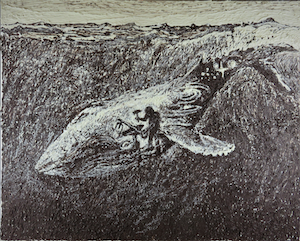

Jonah is a truly remarkable book. However, especially among evangelicals, two obstacles regularly get in the way of our hearing it in its full acoustics. The first is whether or not Jonah is historical. Was Jonah actually swallowed by a large fish? This historical question is not unimportant, but it easily prevents us from listening to Jonah if we make it the main concern. It becomes a serious obstacle if we believe that only if Jonah is history writing can it tell us truth. In its own way fiction can be as truth-telling as history writing, as, for example, Jesus’ parables reveal again and again. The second is whether or not Jonah is about Jesus. It is clear from the Gospels that Jonah is a type of Jesus, but to make Jesus the main focus of our reading of Jonah obscures its powerful message.

In order to really hear Jonah we need to attend to what Brevard Childs called the discrete witness of the OT, before moving on to how it is received in the NT. Jonah meant something to its OT audience/s, and this should be our first focus of attention. Jonah 1:1, for example, alerts us to typical OT prophetic revelation coming to Jonah, and “Nineveh” became the capital of one of Israel’s great enemies, Assyria. We neglect this “historical” dimension to our detriment.
Equally important is the type of literature we find in Jonah. Amidst the twelve minor prophets Jonah, uniquely, is narrative about a prophet. Read Jonah in the Hebrew and you will soon discover that Jonah is exquisitely crafted narrative. Thus, an awareness of OT narrative and how it works is an indispensable tool for accessing the message of Jonah. It is through the poetics of the text that we hear its message. See the section on “Narrative” in David J. H. Beldman’s chapter “Literary Approaches and Old Testament Interpretation,” in Craig G. Bartholomew and David J. H. Beldman, eds., Hearing the Old Testament: Listening for God’s Address (Grand Rapids: Eerdmans, 2012), including his references to further literature in the footnotes. Leslie C. Allen, The Books of Joel, Obadiah, Jonah and Micah (NICOT. Grand Rapids: Eerdmans, 1976), and Kenneth M. Craig, A Poetics of Jonah: Art in the Service of Ideology (Macon, GA: Mercer University Press, 1999), are important and useful sources in this respect.
To really hear Jonah we need imagination. We need to imagine ourselves sitting amidst a group of OT Israelites listening to the story, picking up on the references to other parts of the OT. As we do so we will become alert to Jonah’s privilege of being a recipient of God’s words, of the absolutely extraordinary commission that comes through those words, and we will find ourselves conflicted about Jonah’s reaction. In the process it will gradually dawn upon us that Jonah is … us, Israel, who have the comparable privilege of having God’s oracles. We will journey with this most reluctant prophet who eventually performs God’s command but then becomes exceedingly upset when God does not execute judgement on Nineveh. On the role of imagination in biblical interpretation see Trevor Hart, “Imagination and Responsible Reading,” chapter 15 in Craig G. Bartholomew, et al., eds., Renewing Biblical Interpretation (SAHS 1. Grand Rapids: Zondervan, 2000), and Nicholas Wolterstorff’s response.
Read thus, all sorts of important themes will be pushed to the surface. Themes like: as recipients of God’s words what sort of responsibility do we have to the nations? Are God’s words just for his people (Israel) or are they also for the other nations? On this missional note see Stephen B. Chapman and Laceye C. Warner, “Jonah and the Imitation of God: Rethinking Evangelism in the Old Testament,” JTI 2.I (2008), 43–69. Are we really to care for our great enemies, for those who have caused us so much pain? It is hard here not to recall Dietrich Bonhoeffer’s profound point in relation to 1 Peter 3:9:
“The world lives by the blessing of God and of the righteous and thus has a future. Blessing means laying one’s hand on something and saying, Despite everything, you belong to God. This is what we do with the world that inflicts such suffering on us. We do not abandon it, we do not repudiate, despise or condemn it. Instead we call it back to God, we give it hope, we lay our hands on it and say, may God’s blessing come upon you, may God renew you, be blessed, world created by God, you who belong to your Creator and Redeemer.”(1)

And what are we to make of unbelievers who behave far better than believers, as do the sailors compared with Jonah. See Frank A. Spina, The Faith of the Outsider: Exclusion and Inclusion in the Biblical Story (Grand Rapids: Eerdmans, 2005), chapter 5.
YHWH is clearly the main character in Jonah and what an extraordinary depiction we receive of him. Jonah foregrounds characteristics of YHWH that are rarely found in lists of his attributes, namely his holiness, compassion and patience. Karl Barth is attentive to
God’s patience, and he is well worth reading on this. See Karl Barth, Church Dogmatics 2.1, 406–39. In relation to God’s compassion Jonah concludes on an extraordinary note. God is concerned about the many cattle in Nineveh! His compassion extends to his entire creation.
We know from Genesis 1:26–28 that we are made in the image of God. But are we up to the journey of becoming like God? This question is posed in acute fashion in Jonah. Jonah is invited to become like God. His response is to flee but God pursues him. As he descends in the waters he finds his way back to God again but then becomes very angry with God when God relents from judging the Ninevites. In a Roald Dahl-like twist, we never learn whether Jonah finally came round to God’s way of thinking and acting. Jonah is invited, again and again, to transformation, but did he accept the invitation? Ultimately this does not matter because the book is about us! We have the privilege of being recipients of God’s words, and are we willing to carry God’s image by becoming holy, compassionate and patient? Two excellent readings of Jonah in this respect are André Lacocque and Pierre-Emmanuel Lacocque, The Jonah Complex (Atlanta, GA: John Knox, 1981); Jonah: A Psycho-Religious Approach to the Prophet (Columbia, SC: University of South Carolina Press, 1990).
Read in this way we are in a good position to attend to Jesus’ invocation of Jonah as the only sign to be given to “this generation” in Matthew 12:38–42. See Frederick Dale Bruner, The Christbook, Matthew 1–12 (2nd ed. Grand Rapids: Eerdmans, 2004), 572–585.
Jonah is part of the “Book of the Twelve” (minor prophets) and discussion continues about the extent to which it should be read as part of this “Book.” See in this and other respects Craig G. Bartholomew and Heath A. Thomas, The Minor Prophets: A Theological Introduction (Downers Grove, ILL: IVP Academic, 2023).
Jonah is dynamite. Listen in order to preach, and preach so that we may listen and hear.


Get the latest issue in print or subscribe for the next three.